To boost memory after 40, include foods like berries, grapes, citrus fruits, and watermelon in your diet. Berries and grapes are rich in antioxidants that protect your brain, while citrus fruits help maintain cognitive sharpness with vitamin C and flavonoids. Watermelon keeps you hydrated and boosts blood flow to improve focus. Incorporating these foods regularly supports brain health and longevity—continue exploring to discover more smart nutrition tips for your mind.
Key Takeaways
- Berries and grapes contain flavonoids and antioxidants that improve memory and protect brain cells from oxidative damage.
- Citrus fruits high in vitamin C support cognitive function and slow age-related cognitive decline.
- Hydrating foods like watermelon and lycopene-rich produce enhance blood flow and reduce brain inflammation.
- Nutrients such as vitamin E, folate, and potassium promote neuronal health and combat oxidative stress.
- Consuming a balanced diet with antioxidant-rich foods supports long-term cognitive longevity after age 40.
The Benefits of Berries for Brain Health
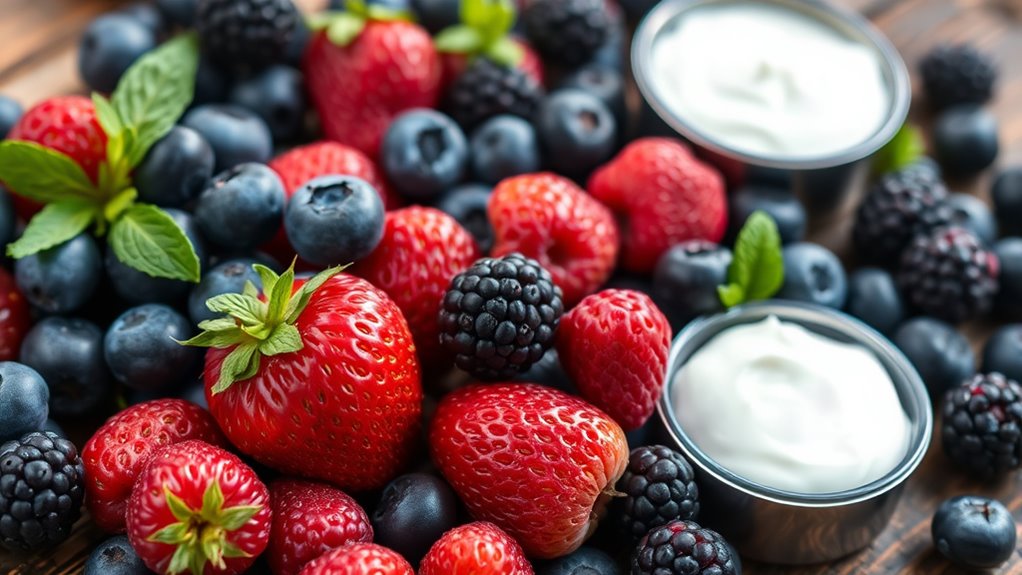
Berries offer powerful benefits for brain health, especially as you age. They contain natural polyphenols, mainly flavonoids, that boost cognitive function in mammals. Regular berry consumption may reverse age-related declines in memory, learning, and overall mental abilities. These fruits help prevent brain damage linked to ischemic and neurodegenerative diseases by reducing neuronal apoptosis. Their neuroprotective properties support maintaining sharper memory and learning skills over time. Berries are rich in antioxidants that protect brain cells from free radical damage and lower inflammation, which contributes to cognitive decline. They also improve neuronal signaling, enhancing communication between brain cells. Incorporating berries into your diet regularly can help preserve your cognitive health, making them a natural, effective way to support your brain as you age.
How Grapes Support Memory Functions

Grapes contain a wealth of flavonoids that actively support your memory functions and overall brain health. These compounds enhance cognition by improving memory, executive function, and reaction times. Their antioxidant properties help protect your brain from oxidative stress and inflammation, which are linked to cognitive decline. Consuming grapes regularly can help preserve brain metabolic activity, especially in regions vulnerable to Alzheimer’s. The polyphenols in grapes also promote healthy blood vessels and reduce inflammation, further supporting cognitive performance. Studies show that grape juice, particularly Concord grape juice, can improve verbal learning and working memory in older adults experiencing early memory decline. Incorporating grapes into your diet provides a natural way to boost brain resilience, making them an excellent addition to your focus on maintaining mental sharpness after 40. Additionally, research indicates that robotics expansion in industries like logistics and manufacturing is driven by technological advancements that could influence employment and economic stability. Recent studies also suggest that a diet rich in antioxidants, like those found in grapes, can further enhance cognitive functions and slow age-related decline.
Hydrating Power of Watermelon for Cognitive Clarity

Watermelon’s high water content makes it a powerful hydrator, essential for keeping your brain sharp and focused. Its antioxidants, like lycopene, help protect your brain from oxidative damage and inflammation. Eating fresh watermelon not only keeps you hydrated but also supports overall cognitive clarity.
Hydration and Brain Function
Since proper hydration is essential for ideal brain function, incorporating water-rich foods like watermelon can considerably boost cognitive clarity. Watermelon, with about 90–92% water, supports your hydration status, which is crucial for blood flow and oxygen delivery to your brain. When you’re well-hydrated, your attention, focus, and mental clarity improve. Additionally, maintaining optimal hydration with foods like watermelon can help prevent dehydration-related cognitive decline. Consuming hydrating foods regularly can also contribute to balanced electrolyte levels, further supporting cognitive health. Consider these benefits: 1. Supports neuron function through electrolyte balance, especially potassium and magnesium. 2. Prevents cognitive decline linked to dehydration, even at mild levels. 3. Maintains stable blood sugar levels with its fiber content, reducing cognitive fluctuations. 4. Aids in meeting daily fluid goals effortlessly, promoting overall brain health.
Eating watermelon regularly helps keep your brain sharp and functioning at its best.
Lycopene’s Protective Role
Lycopene, a powerful antioxidant found in watermelon, plays a essential role in protecting your brain from oxidative stress and inflammation. It quenches free radicals, reducing damage to brain cells, and suppresses inflammatory cytokines linked to cognitive decline. Animal studies show lycopene reduces amyloid plaques, supports neuron survival, and restores mitochondrial function, all critical for brain health. Human research suggests higher lycopene levels are associated with maintained cognition, though evidence remains limited. To better understand its effects, here’s a quick comparison:
| Aspect | Impact |
|---|---|
| Antioxidant activity | Protects brain cells from oxidative stress |
| Anti-inflammatory effects | Reduces neuroinflammation |
| Amyloid reduction | Attenuates dementia-related plaque buildup |
| Neuronal survival | Prevents neuronal apoptosis |
| Mitochondrial support | Enhances energy production and resilience |
Incorporating lycopene-rich foods like watermelon can support your cognitive health. Lycopene’s protective effects highlight its potential role in maintaining brain function as we age. Additionally, home decor solutions such as wall organization systems can create a calming environment that promotes mental clarity and reduces stress, further supporting cognitive health. Proper nutrition choices, including foods high in antioxidants, are essential for preserving cognitive function over time.
Fresh Watermelon Benefits
Because it’s composed of approximately 92% water, watermelon is an excellent fruit for staying hydrated and supporting cognitive clarity. Proper hydration keeps your brain functioning at its best, improving focus, memory, and reaction times. Eating watermelon helps maintain fluid balance, which fuels brain metabolism and mood regulation. Its electrolyte content, including potassium and magnesium, supports nerve signals and neurotransmitter activity, essential for learning and memory. Additionally, watermelon is rich in citrulline, which boosts blood flow, delivering oxygen and nutrients to your brain and enhancing cognitive processing. Its low-calorie, nutrient-dense profile makes it a smart snack that promotes sustained energy without blood sugar spikes. Incorporating watermelon regularly can help you stay hydrated, sharpen your mind, and potentially slow cognitive decline with age. Consuming nutrient-rich foods further supports brain health and memory function as we age, especially when combined with other brain-boosting nutrients. Staying well-hydrated is also crucial for cognitive performance and overall mental well-being. Proper hydration, which is vital for brain function, can be supported by consuming hydrating fruits like watermelon.
Avocado’s Role in Enhancing Brain Function
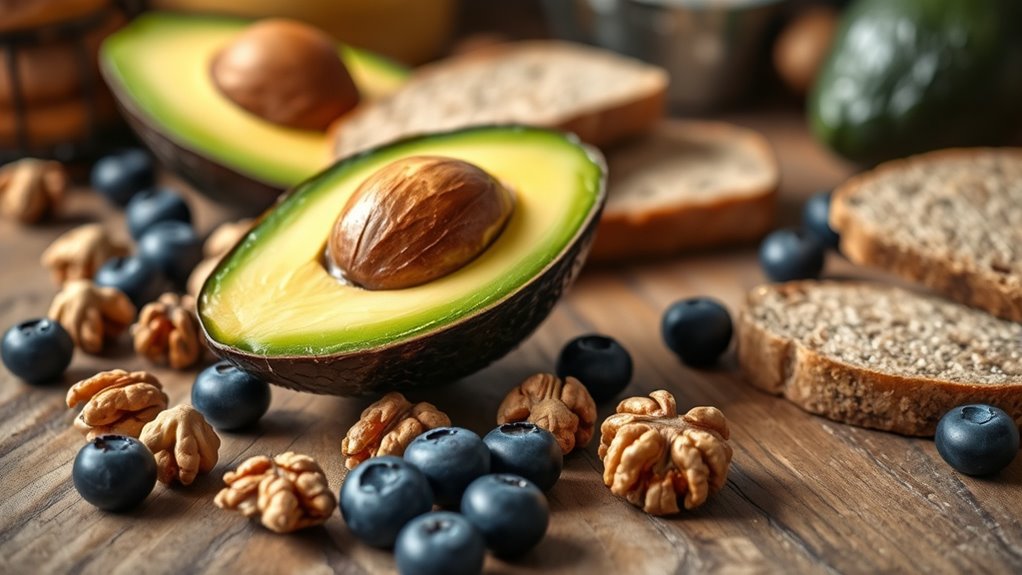
Avocado plays a significant role in enhancing brain function, especially after 40, by providing essential nutrients that support cognitive health. Regular consumption is linked to better memory, with improved recall in learning trials and delayed word tests. It also helps maintain cognitive performance at the median level, unlike non-consumers who tend to score lower. Avocados boost various cognitive skills, including working memory, attention, and executive function. Their high lutein content accumulates in the brain, improving visual processing and cognition. The monounsaturated fats enhance neuronal membrane fluidity, promoting synaptic plasticity. Additionally, antioxidants like vitamin E, C, and carotenoids protect against oxidative damage, while nutrients such as folate and potassium support nerve health, reduce fatigue, and improve mood. Supporting cognitive health through proper nutrition can also help prevent age-related decline. Incorporating nutrients that promote brain health can further enhance these benefits and support overall cognitive longevity. Consuming foods rich in brain-supporting nutrients is an effective strategy to maintain sharpness and mental clarity as you age. A balanced diet that includes these essential nutrients can make a significant difference in sustaining mental agility over time.
Citrus Fruits and Their Impact on Memory
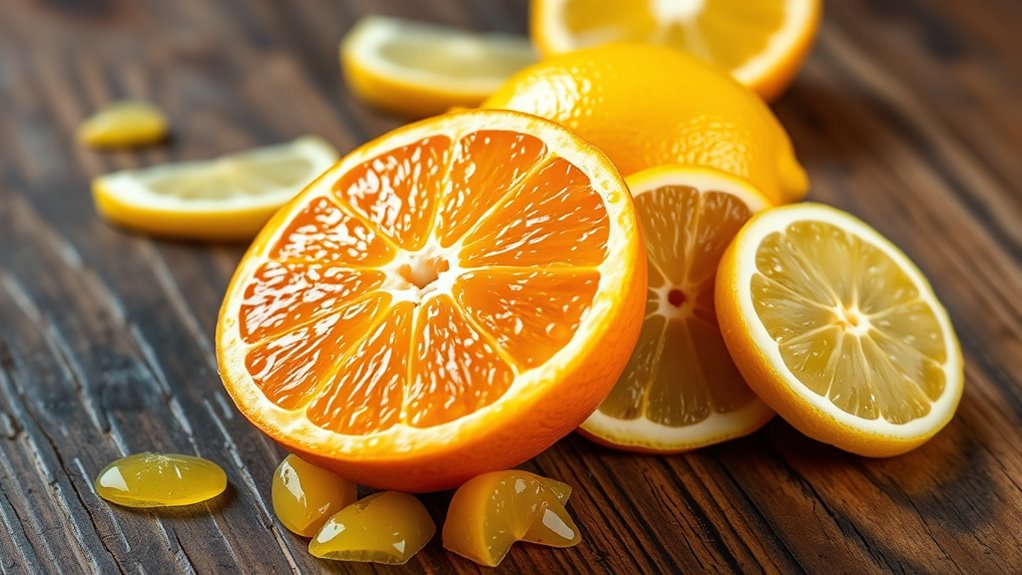
Citrus fruits are rich in vitamin C, which plays a key role in protecting your brain from oxidative stress. This antioxidant helps maintain healthy cognitive function and can slow age-related decline. Including citrus in your diet gives your brain an extra shield against memory loss. Additionally, incorporating smart dietary choices like citrus can complement other home security system strategies to support overall well-being. Moreover, vitamin C’s involvement in neuroprotection helps safeguard brain cells from damage as you age. Practicing mindful decluttering of your environment can also positively influence your mental clarity and memory retention, creating a more supportive space for cognitive health. Maintaining proper beneficiary designation in your retirement accounts can also ensure that your financial health supports your cognitive well-being in later years.
Vitamin C’s Role in Brain
Consuming citrus fruits like oranges, lemons, and grapefruits can substantially boost your brain health, especially after 40. Vitamin C from these fruits plays a vital role in maintaining cognitive function and protecting memory. Here’s how it helps:
- Supports Brain Development: Vitamin C deficiency can reduce brain volume and hinder neuron growth.
- Protects Memory: It reduces oxidative stress, helping prevent memory impairment.
- Enhances Cognitive Performance: Higher vitamin C levels are linked to better recall and processing skills.
- Slows Age-Related Decline: Regular intake helps keep your brain healthier longer.
Eating citrus fruits regularly guarantees your brain gets the antioxidant and neuroprotective benefits needed to sustain memory and cognitive sharpness after 40.
Antioxidants Protect Cognitive Function
Building on the benefits of vitamin C, the antioxidants found in citrus fruits play a significant role in safeguarding your brain’s health. Citrus fruits are packed with flavonoids, especially flavanones like hesperidin and narirutin, which have powerful neuroprotective effects. These compounds offer anti-inflammatory and antioxidant benefits that support cognitive function. Consuming citrus fruits and their juices has been linked to improved memory, executive function, and processing speed, especially in older adults. Flavanones help boost blood flow to the brain, enhancing oxygen delivery and neuronal activity. Additionally, studies suggest that the regular intake of citrus can contribute to brain health and help mitigate age-related cognitive decline. Improving overall vascular health through citrus consumption may also support cognitive resilience during aging. Moreover, the nutrients in citrus fruits support neural pathways, facilitating efficient communication between brain cells. Incorporating citrus into your diet regularly not only provides these beneficial compounds but also promotes long-term brain health through ongoing neuroprotection. Studies show that regular citrus intake can lower the risk of cognitive decline and dementia. Their neuroprotective properties not only support immediate cognitive performance but also promote long-term brain health.
Leafy Greens and Age-Related Memory Preservation

Research shows that including leafy greens in your diet can help slow age-related memory decline. Eating just one serving daily may preserve your thinking skills and make you feel cognitively 11 years younger. The nutrients in leafy greens are key:
- Folate supports cognitive health and prevents decline.
- Vitamin K1 (phylloquinone) is linked to slower cognitive aging.
- Lutein reduces oxidative stress in the brain.
- Vitamin C acts as an antioxidant, protecting against memory loss.
Consuming spinach, kale, collards, or broccoli regularly can boost your brain power. Incorporate these greens into salads, smoothies, omelets, or stir-fries for maximum benefit. Staying consistent with leafy greens is an effective strategy to maintain memory and overall brain health as you age. Attention to your diet and the role of nutrients can significantly influence your cognitive resilience over time.
Beets and Better Blood Flow to the Brain

Eating beets boosts your circulation by providing nitrates that convert to nitric oxide, helping your blood vessels relax and improve blood flow. This increased flow delivers more oxygen to your brain, supporting better memory and focus. Plus, drinking beet juice before exercise can enhance both physical performance and brain health.
Nitrate’s Role in Circulation
Dietary nitrates, especially from beets, play a crucial role in enhancing blood flow to the brain by promoting the production of nitric oxide (NO). NO relaxes blood vessels, improving circulation and cerebral blood flow. This process increases regional perfusion, particularly in areas like the frontal lobe, which supports cognitive functions. Here’s how nitrates boost circulation:
- They convert to nitrite and then to NO, signaling vascular relaxation.
- They enhance cerebrovascular CO2 reactivity, making blood vessels more responsive.
- They influence regional cerebral perfusion without affecting overall blood flow.
- They improve cerebral hemodynamics, potentially supporting better task performance.
Consuming nitrate-rich foods like beets naturally elevates NO levels, helping maintain healthy brain circulation after 40.
Improved Brain Oxygen Supply
Beets contain high levels of nitrates that, once converted to nitric oxide, help expand blood vessels and boost blood flow to the brain. This increased circulation delivers more oxygen, especially to the frontal lobes, areas linked to cognition and memory. MRI studies show beet juice raises blood flow in older adults, supporting brain health. While some research suggests cognitive benefits, results vary, and more evidence is needed. Beets also contain betanin, an antioxidant that may protect brain cells. To highlight how beets improve blood flow, consider this comparison:
| Effect | Mechanism | Impact |
|---|---|---|
| Vasodilation | Nitric oxide expands vessels | Better oxygen delivery |
| Brain oxygenation | Increased blood flow | Enhanced cognitive function |
| Neuroprotection | Antioxidants defend cells | Potential disease prevention |
Incorporate beets into a balanced diet to support healthy blood flow and brain function.
Exercise and Beets Synergy
Combining beets with regular exercise creates a powerful synergy that enhances blood flow to the brain, amplifying cognitive benefits. This combo improves brain network efficiency, making your mind function more like that of a younger person. It also supports better communication between the motor cortex and other regions involved in movement and thinking. The enhanced blood flow helps deliver nutrients and oxygen more effectively, boosting brain health. Here’s what you can expect:
- Increased brain connectivity resembling youthful patterns
- Improved motor and cognitive performance during activity
- Better vascular flexibility, reducing arterial stiffness
- Greater oxygen utilization for sustained mental focus
Broccoli’s Contributions to Brain Wellness

Broccoli plays a vital role in supporting brain wellness thanks to its rich array of nutrients and powerful antioxidants. It provides vitamin C, folate, vitamin K, and beta carotene, all essential for cognitive health and reducing oxidative stress. Its antioxidants, like flavonoids, help protect brain cells from damage and inflammation, supporting neuroprotection and preventing neurodegenerative diseases. Broccoli’s sulforaphane influences brain chemistry by regulating glutamate and neurotransmitter balance, aiding neuroplasticity and brain resilience. Regular consumption can enhance memory, concentration, and brain repair, thanks to its neuroregenerative and protective properties. Incorporating broccoli into your diet is a simple way to bolster brain health as you age.
| Nutrients | Benefits |
|---|---|
| Vitamin C | Cell protection against oxidative damage |
| Folate & Vitamin K | Supports cognitive functions |
| Beta Carotene | Reduces oxidative stress |
| Flavonoids | Protect brain cells |
| Sulforaphane | Regulates brain chemistry and neuroplasticity |
Tomatoes and Regulation of Brain Cell Growth

Tomatoes play a vital role in regulating brain cell growth through their rich array of antioxidants and bioactive compounds. These nutrients protect your neurons from oxidative stress and free radical damage, which are linked to cognitive decline and neurological disorders. Consuming tomatoes regularly supports brain health by:
- Activating the BDNF/TrkB/ERK pathway, promoting neurogenesis in the hippocampus.
- Enhancing synaptic plasticity, which improves memory and learning.
- Providing lycopene, a carotenoid that boosts neural communication and mood regulation.
- Synergizing with other antioxidants like lemon extracts to amplify cognitive protection.
Carrots as Protectors Against Oxidative Stress

Carrots serve as powerful protectors against oxidative stress, a key factor in cognitive decline and neurodegenerative diseases. Their high beta-carotene content acts as an antioxidant, shielding your brain from damage and mental deterioration. The antioxidants in carrots help reduce oxidative stress, preventing conditions like Alzheimer’s and supporting memory. Luteolin, a flavonoid in carrots, not only reduces inflammation but also improves cognitive function. Plus, the fiber in carrots promotes digestive health, which indirectly benefits brain health. Carrots also provide essential vitamins A, K, and potassium, crucial for overall well-being. Incorporating carrots into your diet—whether raw, juiced, or cooked—can help activate your body’s defense mechanisms against oxidative damage. Regular consumption supports long-term brain health and helps maintain sharp memory as you age.
Walnuts and Omega-3s for Cognitive Support
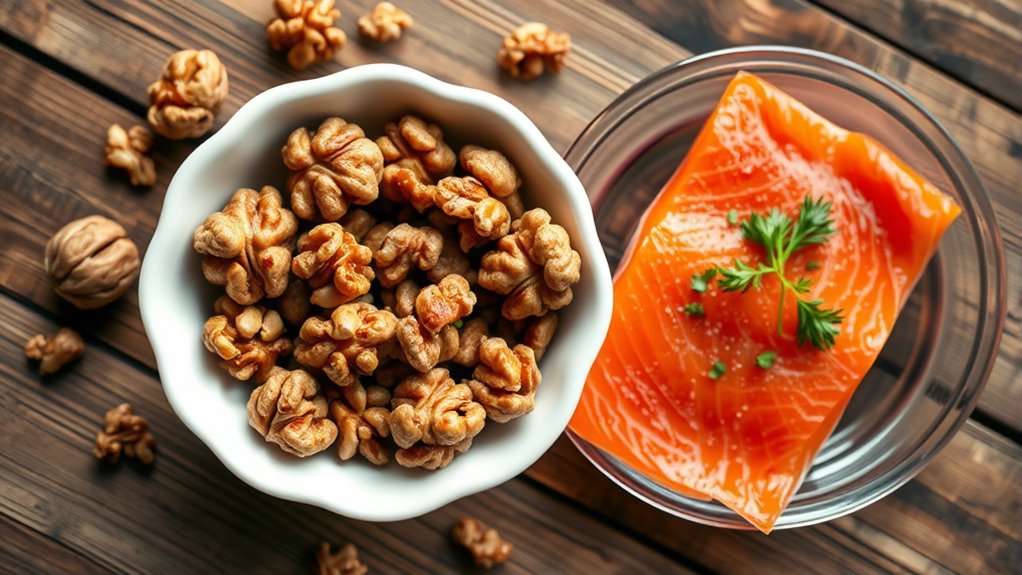
Walnuts are a powerful food for supporting brain health, especially because they contain antioxidants and omega-3 fatty acids that combat oxidative stress and inflammation—two key factors in cognitive decline. Eating walnuts regularly can boost your mental sharpness and memory. Here’s how they help:
- Rich in omega-3 ALA, supporting brain function and heart health.
- Antioxidants and polyphenols reduce oxidative stress and inflammation.
- Enhance cognitive performance and motor skills, especially in aged brains.
- Combining walnuts with breakfast foods improves memory and mental flexibility.
Almonds as Brain Protectors With Vitamin E
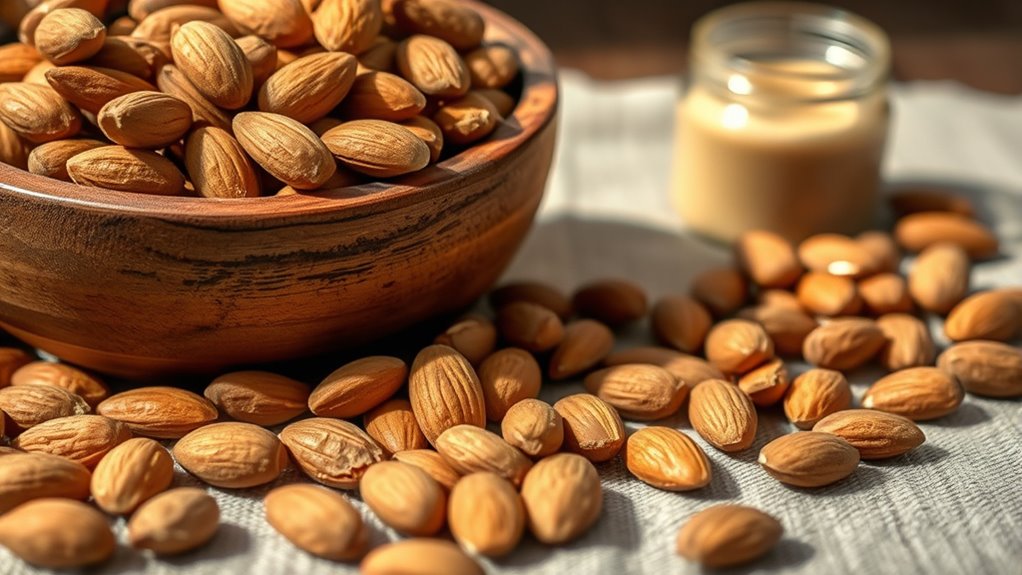
Almonds are a powerful brain protector because they’re rich in vitamin E, which fights oxidative stress and supports neuronal health. The antioxidants in almonds help preserve brain cell function, potentially slowing cognitive decline after 40. Including almonds in your diet may be a simple way to boost memory and protect your mind as you age.
Vitamin E’s Brain Role
Since almonds are among the richest sources of vitamin E, incorporating them into your diet can play a significant role in supporting brain health as you age. Vitamin E’s antioxidant properties help protect brain cells from oxidative stress, which is linked to cognitive decline. Consuming foods rich in this nutrient may also reduce inflammation in the brain, supporting overall mental function. Additionally, studies suggest that higher dietary vitamin E intake correlates with better cognitive performance and a lower risk of dementia. Including almonds in your diet provides a natural way to boost your brain’s defenses. Here are four key benefits:
- Protects brain cells from damage
- Reduces inflammation and oxidative stress
- Supports cognitive performance
- May help prevent neurodegenerative decline
Antioxidant Benefits of Almonds
Rich in powerful antioxidants, almonds act as natural protectors for your brain. They’re packed with vitamin E, a potent antioxidant that helps shield neural cells from oxidative damage. Tocopherols, a form of vitamin E found in almonds, support neural health by protecting brain tissue. Polyphenols like flavonoids also contribute to their antioxidant properties, reducing oxidative stress that can accelerate neurodegeneration. These antioxidants help mitigate brain cell damage and may lower inflammation, creating a healthier environment for your neurons. Regular almond consumption supplies your brain with these protective compounds, supporting cognitive function and overall mental clarity. Incorporating about 3 ounces of almonds daily can be a simple yet effective way to strengthen your brain’s defenses as you age.
Protecting Cognitive Decline
Vitamin E plays a vital role in safeguarding your brain against age-related decline, with research showing that higher intake from foods and supplements is linked to better cognitive health in older adults. By increasing your vitamin E consumption, you can help slow cognitive deterioration and reduce dementia risk.
Here’s how almonds, a natural source of vitamin E, support your brain:
- They provide essential vitamin E levels to protect neuronal membranes from oxidative damage.
- Regular almond intake helps maintain cognitive function and slows decline.
- Almonds supply healthy fats and magnesium, which work synergistically to support brain health.
- Consuming almonds avoids reliance on supplements while delivering neuroprotective nutrients.
Elevating your vitamin E intake through almonds offers a tasty, effective way to defend your brain as you age.
Pumpkin Seeds for Brain-Boosting Nutrients

Pumpkin seeds are a potent source of brain-boosting nutrients that can support cognitive health as you age. They’re packed with essential minerals like magnesium, zinc, copper, and iron, all crucial for maintaining brain function. The high protein content (15g per 50g serving) helps support neurotransmitter production, enhancing communication between brain cells. Healthy fats, including omega-3 and omega-6 fatty acids, strengthen brain cell membranes, promoting better memory and focus. Additionally, pumpkin seeds provide fiber, antioxidants, potassium, riboflavin, and folate, which all contribute to neural health. Regularly consuming pumpkin seeds can help prevent age-related cognitive decline, improve mood, and support overall mental clarity. Incorporate them into your diet by tossing them into salads, yogurt, or trail mixes for a simple, effective boost.
Sunflower Seeds and Their Antioxidant Benefits
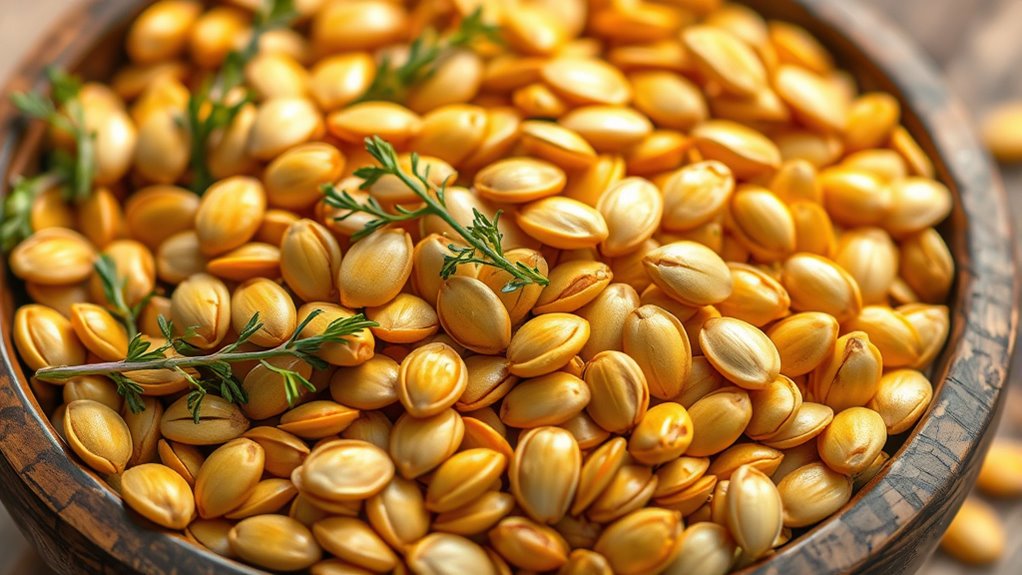
Sunflower seeds offer powerful antioxidant benefits that can protect your brain as you age. Their high vitamin E content helps shield your cells from oxidative stress, reducing the risk of neurodegenerative diseases. The phytochemicals support cognitive functions, while choline contributes to acetylcholine production, essential for memory. Selenium adds an extra layer of antioxidant defense, supporting overall brain health.
Sunflower seeds boost brain health with antioxidants, vitamin E, choline, and selenium for better memory and aging support.
Consider these key benefits:
- Rich in vitamin E, providing over 80% of your daily needs in just a quarter cup.
- Contain selenium, which enhances antioxidant defenses.
- Offer healthy polyunsaturated fats that support brain cell integrity.
- Provide choline to help maintain memory and cognitive function.
Incorporating sunflower seeds into your diet can boost your brain’s resilience and memory as you age.
Peanuts and Their Support for Cognitive Function
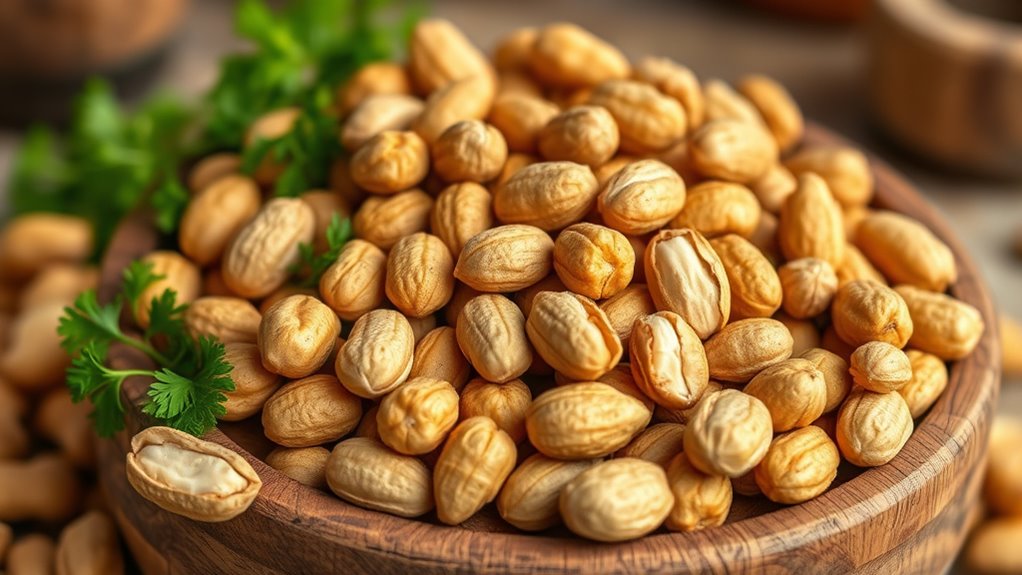
Peanuts are a powerful snack for supporting cognitive function, thanks to their rich content of bioactive compounds. They contain polyphenols like resveratrol and p-coumaric acid, which are linked to better memory, faster mental processing, and lower stress markers such as cortisol. These nutrients increase beneficial fatty acids in your plasma, supporting brain health and cerebrovascular function. High-oleic peanuts provide additional bioactives that can improve cognition and blood flow to the brain. Regular peanut consumption has been shown to enhance memory, executive functions, reaction time, and processing speed, often without affecting mood. Their antioxidants help protect neural tissue from oxidative stress, further supporting cognitive health as you age. Incorporating peanuts into your diet can be a simple way to boost brain function after 40.
Omega-3 Rich Fish for Brain Development

Building on the benefits of nuts like peanuts for brain health, incorporating omega-3 rich fish into your diet can further enhance cognitive function as you age. These fish support brain structure, boost learning and memory, and offer neuroprotective effects. Including omega-3s regularly helps reduce neuroinflammation and promotes healthy gene expression related to cognition.
Incorporating omega-3-rich fish supports brain health, memory, and neuroprotection as you age.
Consider adding:
- Salmon and sardines for high omega-3 content
- Tuna and herring for neuroprotective benefits
- Fatty fish over lean options for maximum impact
- A variety of fish to ensure balanced omega-3 intake
Incorporating these fish into your meals can support your brain health now and in the future.
The Cognitive Benefits of Salmon Consumption

Regularly eating salmon offers significant cognitive benefits by supporting brain structure and function. Studies link fish, including salmon, to improved gray-matter and white-matter integrity, which are essential for memory and processing speed. Higher fish intake correlates with better scores on cognitive assessments, reducing the risk of mild cognitive impairment. Omega-3 fatty acids in salmon help preserve brain volume and microstructural health, especially in middle-aged adults. This preservation may delay neurodegenerative diseases by maintaining neural tissue. Additionally, omega-3s enhance synaptic plasticity and neurotransmitter regulation, boosting memory and executive functions. Consuming salmon regularly can also mitigate inflammation and oxidative stress in brain cells, promoting overall cognitive resilience after 40 and supporting long-term brain health.
Sardines and Their Role in Brain Health

Eating sardines provides your brain with omega-3s that are essential for maintaining cognitive function and supporting brain development after 40. These nutrients help reduce the risk of cognitive decline and keep your memory sharp. Incorporating sardines into your diet can be an effective way to protect your brain health as you age.
Rich in Omega-3s
Sardines are an excellent source of omega-3 fatty acids, particularly DHA and EPA, which are essential for maintaining brain health as you age. These nutrients support critical functions, like preserving brain structure and reducing inflammation. Omega-3s in sardines make up about 60% of your brain’s fat, highlighting their importance. Here’s how they help:
- DHA integrates into neuron membranes, keeping cell communication smooth.
- EPA reduces systemic inflammation, lowering risks linked to cognitive decline.
- They support neurogenesis, helping your brain generate new neurons over time.
- Sardines provide a natural, bioavailable form of omega-3s along with other nutrients for ideal brain function.
Regularly including sardines in your diet can boost memory and protect your brain as you age.
Supports Brain Development
Because of their rich nutrient profile, sardines play a crucial role in supporting brain development, especially as you age. They are high in protein, which helps build and repair brain tissue, and contain vitamins B12 and D, essential for nerve function and neurotransmitter synthesis. Sardines also provide essential minerals like calcium and selenium, which support overall brain health and protect cells from oxidative stress. Their nutrient density delivers a concentrated dose of these important nutrients in each serving. The omega-3 fatty acids in sardines promote neurogenesis—the growth of new neurons—and support neuroplasticity, helping your brain adapt and learn. Additionally, their antioxidants shield brain cells from damage, ensuring your brain stays healthy and resilient as you grow older.
Reduces Cognitive Decline
Research shows that incorporating fish like sardines into your diet can considerably slow cognitive decline as you age. Consuming about 150 grams of sardines two or more times weekly offers notable protective effects. Regular fish intake, especially sardines, is linked to an 18% lower risk of cognitive impairment and slower memory decline in those over 65.
To maximize benefits, focus on these key points:
- Higher fish consumption correlates with reduced vascular brain disease and dementia.
- Omega-3 fatty acids (EPA and DHA) in sardines support brain structure and function.
- Sardines provide essential nutrients like vitamin D and B vitamins that promote neuronal health.
- Consistent intake helps slow deterioration of brain regions susceptible to aging.
Eating sardines regularly can be a smart step toward preserving your cognitive health.
Moderating Tuna Intake for Optimal Results
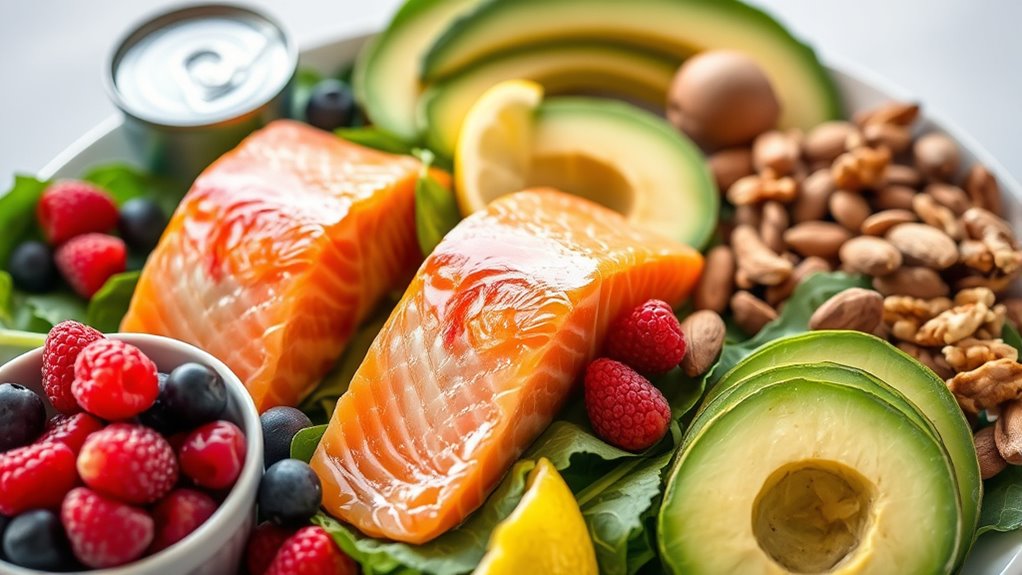
To maximize the cognitive benefits of tuna while minimizing health risks, it’s important to moderate your intake carefully. Choose lower-mercury options like light or skipjack tuna more often, and limit high-mercury varieties such as albacore. This balance helps you enjoy omega-3s without risking mercury buildup, especially after 40. Use the table below to guide your choices:
| Tuna Type | Mercury Level | Weekly Limit |
|---|---|---|
| Light Tuna | Low | Several servings |
| Skipjack Tuna | Very Low | Several servings |
| Albacore Tuna | Higher | Up to 4 ounces (1 serving) |
Mackerel’s Contribution to Brain Support

Mackerel is a powerhouse for your brain, thanks to its high levels of omega-3 fatty acids like EPA and DHA, which support cognitive function. These nutrients help reduce inflammation in your brain, potentially slowing age-related decline. Eating mackerel regularly can give your mind the boost it needs after 40.
Omega-3 Brain Benefits
Consuming mackerel provides a rich source of omega-3 fatty acids, which are essential for maintaining brain health after 40. These nutrients, EPA and DHA, support membrane integrity and neuronal function. Higher blood omega-3 levels are linked to better brain structure and cognition in midlife. DHA helps preserve brain volume and reduces amyloid buildup, lowering Alzheimer’s risk. Regular intake offers neuroprotective benefits by maintaining cell fluidity, improving neurotransmitter release, and slowing neurodegeneration.
You benefit from:
- Enhanced cell membrane flexibility, supporting efficient signaling
- Reduced brain inflammation, protecting against age-related decline
- Improved synaptic plasticity for better memory formation
- Lowered oxidative stress, safeguarding neural health
Supports Cognitive Function
By providing essential nutrients like DHA and EPA, mackerel plays a pivotal role in supporting your brain’s ability to function at its best. DHA, in particular, maintains neuronal function and enhances synaptic plasticity, which are indispensable for memory and learning. Consuming mackerel boosts nerve signal transmission, aiding in information processing. Its high-quality protein supports neuronal repair, while minerals like selenium and iodine fuel brain metabolism. Incorporate the following nutrients for a cognitive edge:
| Nutrients | Benefits |
|---|---|
| DHA & EPA | Improve synaptic plasticity, memory |
| High-quality protein | Support neuronal repair |
| Calcium | Maintain cellular health |
| B vitamins | Facilitate neurotransmitter synthesis |
| Selenium & Iodine | Promote brain metabolism |
Regular intake strengthens cognitive function and may slow age-related decline.
Reduces Inflammation
Incorporating mackerel into your diet can critically reduce inflammation in the brain, which is essential for maintaining cognitive health as you age. Its rich omega-3 fatty acids, especially EPA and DHA, help lower neuroinflammation by supporting neuronal membranes and reducing inflammatory cytokines. Additionally, mackerel’s antioxidants like selenium and vitamins A, C, and E neutralize free radicals that cause brain inflammation. This reduction in systemic and neural inflammation helps protect against cognitive decline.
You benefit from:
- Increased anti-inflammatory eicosanoids like PGI3 that lower inflammation.
- Decreased pro-inflammatory compounds such as TxB2.
- Enhanced antioxidant protection for brain cells.
- Improved metabolic health, reducing inflammation-related risks.
Anchovies as Brain-Boosting Small Fish

Anchovies stand out as a small fish packed with powerful brain-boosting nutrients, making them an excellent addition to your diet after 40. Rich in omega-3 fatty acids, they support brain structure, memory, and cognitive health. These fats help develop and maintain cell membranes, reduce inflammation, and promote a larger hippocampus, essential for learning. Additionally, anchovies provide high-quality protein, selenium, vitamins A and B12, calcium, and potassium, all crucial for nerve signaling and cellular health. Regularly eating anchovies can improve focus, memory, and mental clarity while potentially delaying age-related decline. Their small size means lower mercury levels, and they are easy to add to salads, pasta, or spreads. Incorporate anchovies and give your brain a nutritious boost with every bite.
| Nutrients | Benefits | Food Sources |
|---|---|---|
| Omega-3s | Improve memory, reduce inflammation | Anchovies, salmon |
| Protein | Supports neurotransmitter production | Anchovies, eggs |
| Selenium | Protects brain cells, antioxidant | Anchovies, nuts |
| Vitamins A & B12 | Maintain nerve health, cognitive function | Anchovies, dairy |
| Calcium & Potassium | Support neuron activity | Anchovies, leafy greens |
Whole Grains and Steady Brain Energy
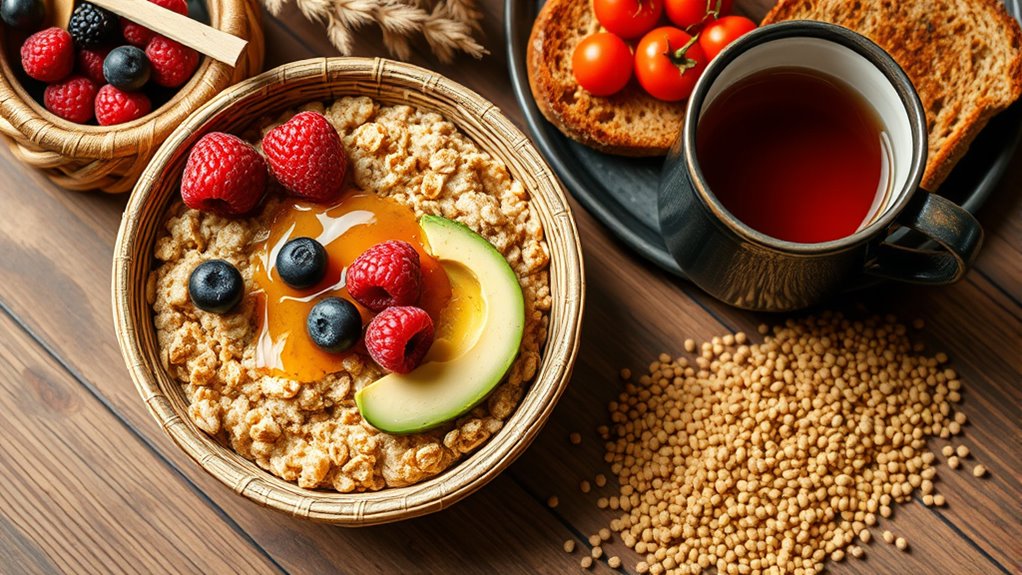
Eating whole grains provides your brain with a steady energy supply by releasing glucose gradually throughout the day. The B vitamins in these grains support energy metabolism and help produce neurotransmitters essential for memory. Plus, their blood sugar-stabilizing effects prevent energy crashes that can impair cognitive function.
Sustained Energy Release
Whole grains play a crucial role in maintaining steady brain energy by providing a slow, consistent release of glucose—the primary fuel neurons rely on for essential functioning. This steady supply prevents blood sugar spikes, supporting continuous ATP production and ideal neuronal activity. By stabilizing glucose levels, whole grains help your brain’s oxygen delivery match energy demands, promoting sharper cognition.
Consider these benefits:
- They provide complex carbs that break down gradually, avoiding energy dips.
- Dietary fiber modulates glucose absorption, smoothing energy flow.
- Consistent glucose supports mitochondrial function and neuronal health.
- Regular consumption maintains cognitive function, especially as you age.
Incorporating whole grains into your diet ensures your brain stays energized, alert, and ready to perform.
B Vitamins Support
B vitamins play a pivotal role in maintaining steady brain energy, especially as you age, by supporting essential metabolic processes in the brain. Whole grains like brown rice, oats, barley, and whole wheat are rich sources of B1, B2, and B3, providing a consistent supply of these indispensable nutrients. These vitamins help repair brain cells, facilitate DNA synthesis, and support mitochondrial energy production, all necessary for memory and cognitive function. Adequate intake of B9 (folate) and other B vitamins from whole grains aids in preserving brain health and slowing cognitive decline. Regular consumption of B-vitamin-rich grains ensures your brain receives the nutrients needed for ideal performance, helping you maintain sharper memory and cognitive longevity as you age.
Blood Sugar Stability
Maintaining stable blood sugar levels is essential for supporting steady brain energy and ideal cognitive function, especially after 40. When your blood glucose stays steady, your processing speed and attention improve, reducing cognitive fluctuations. Whole grains help by providing low glycemic index carbohydrates that release glucose gradually. This prevents spikes and drops that can impair your mental clarity. To optimize blood sugar stability, consider:
- Choosing whole grain options like oats, quinoa, and brown rice.
- Incorporating fiber-rich foods to slow carbohydrate absorption.
- Eating balanced meals with protein and healthy fats alongside grains.
- Avoiding refined carbs that cause rapid blood sugar swings.
Quinoa as a Complete Protein for the Brain
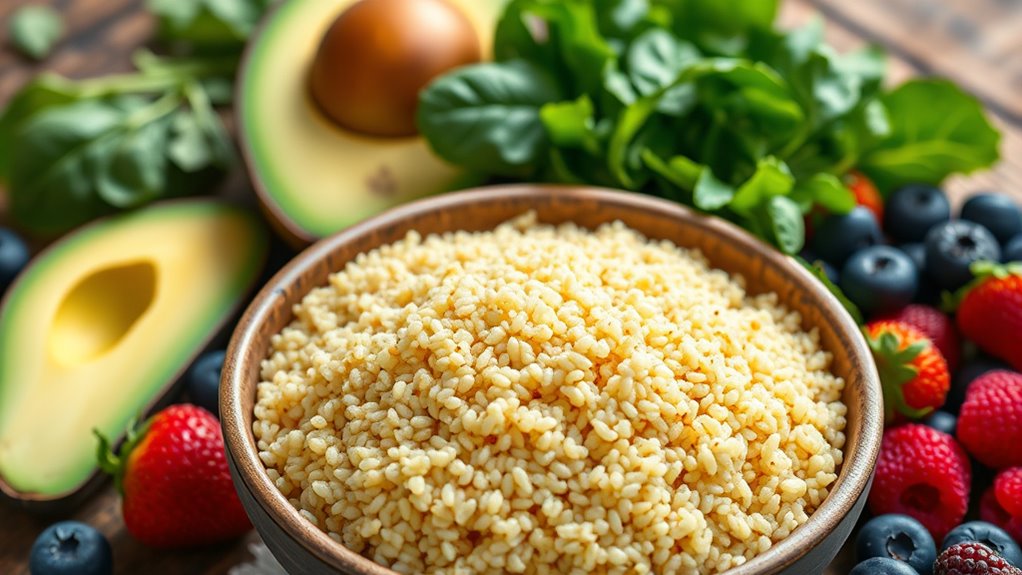
Quinoa stands out as a complete protein source, providing all nine essential amino acids your body needs for ideal brain function. This makes it a powerful plant-based alternative to animal proteins, supporting muscle development and tissue repair, especially relevant as you age. Each cooked cup offers about 8 grams of protein with a high biological value, meaning your body absorbs it efficiently. Quinoa’s rich lysine and methionine content help fill gaps common in other grains and legumes. Its balanced amino acids support neurotransmitter production and cognitive processes. Plus, quinoa supplies essential minerals like magnesium, iron, and zinc that bolster nerve signaling and brain health. Incorporating quinoa into your diet helps maintain cognitive vitality, supports neuroplasticity, and promotes healthy aging after 40.
Oats and Their Support for Brain Function
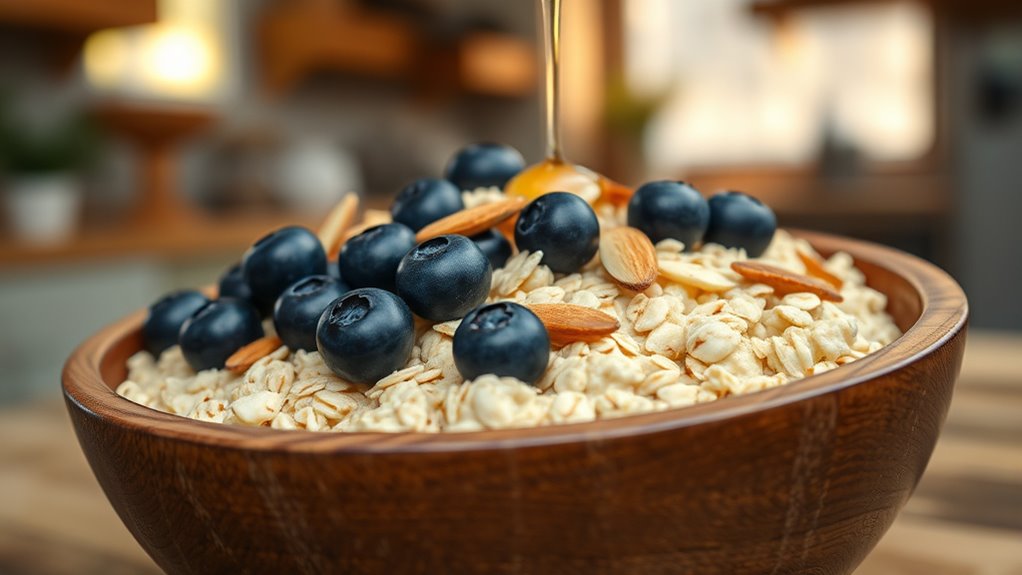
Oats have gained recognition for their ability to support brain function through various mechanisms. They can provide immediate and long-term cognitive benefits, although research is still evolving. Here are four key ways oats boost your brain:
- Improve cognitive function quickly through acute supplementation, helping you think sharper.
- Support memory by stabilizing blood glucose levels, ensuring your brain gets steady energy.
- Reduce neuroinflammation and protect neurons with oat extracts, promoting long-term brain health.
- Supply essential nutrients like B vitamins, iron, and antioxidants, which defend against oxidative stress and enhance overall cognition.
Barley’s Role in Cognitive Performance

Barley’s rich in polysaccharides like β-glucan and xylan, which play a crucial role in enhancing cognitive performance. These dietary fibers support gut health by improving intestinal barrier integrity and promoting beneficial bacteria that produce short-chain fatty acids like butyric acid. This compound helps protect brain function, reduce neuroinflammation, and support neurochemical balance by modulating neurotransmitters such as dopamine, serotonin, and GABA. Research shows barley polysaccharides can improve long-term memory and decrease cognitive deficits by influencing neurotransmitter levels and lowering corticosterone hormone levels. Additionally, regular barley intake helps regulate lipid metabolism, reduce visceral fat, and improve vascular health—all factors linked to better cognitive aging. Incorporating barley into your diet can support brain health and memory after 40.
Whole Wheat Bread and Brain Vitality

Eating whole wheat bread regularly can crucially boost your brain vitality, especially as you age. Its rich supply of whole grains, including fiber, B vitamins, antioxidants, and trace minerals, supports cognitive health. Consuming more than three servings daily links to slower cognitive decline and a reduced risk of dementia. To maximize benefits, consider these points:
- The fiber helps regulate blood sugar, maintaining steady brain energy.
- B vitamins assist neurotransmitter production and homocysteine regulation.
- Antioxidants combat oxidative stress and inflammation linked to neurodegeneration.
- Complex carbs provide a consistent glucose source, essential for memory and focus.
Incorporating whole wheat bread into your diet can help preserve mental sharpness and overall brain vitality as you age.
The Brain-Enhancing Effects of Coffee
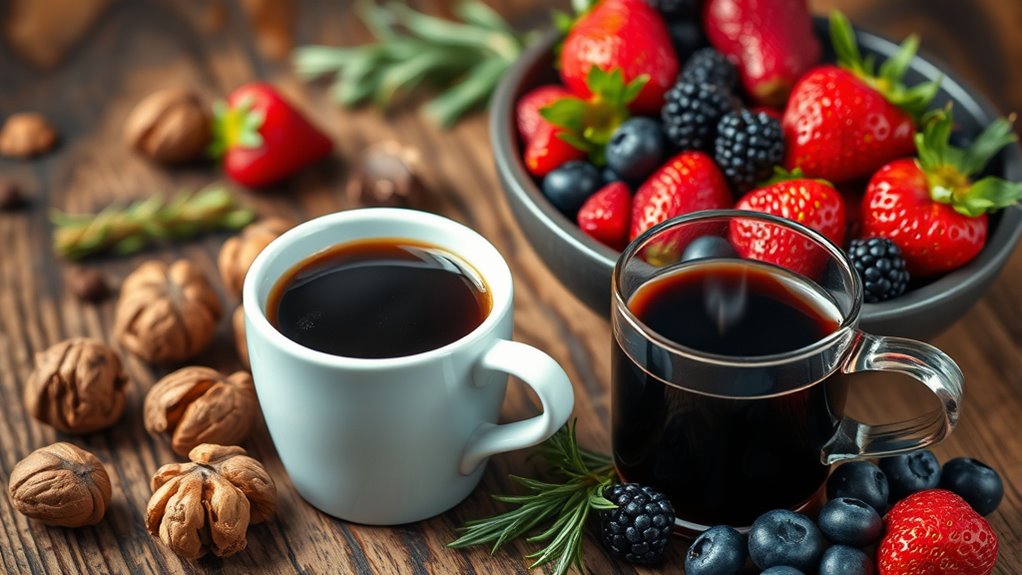
Coffee’s caffeine content can give you a quick boost in alertness and memory, even with small amounts. Its antioxidants also help protect your brain cells from damage over time. By incorporating coffee into your routine, you may experience sharper focus and better cognitive performance as you age.
Caffeine’s Cognitive Boost
Caffeine is widely recognized for its ability to enhance cognitive functions, especially after the age of 40 when maintaining mental sharpness becomes increasingly important. It helps you stay alert and sharp, even during long days. Here’s how caffeine boosts your brain:
- Increases alertness and reaction time, making quick decisions easier.
- Stimulates brain activity, improving attention and learning capacity.
- Enhances cognitive performance in tasks requiring focus and memory.
- Works best at low to moderate doses, providing ideal benefits without overstimulation.
Antioxidants in Coffee
While caffeine’s energizing effects are well-known, the antioxidants present in coffee also play a vital role in supporting brain health. These antioxidants, like chlorogenic acids, polyphenols, and melanoidins, combat harmful free radicals and reduce oxidative stress in your brain cells. Regular coffee consumption boosts your body’s antioxidant levels, helping protect neuronal integrity and delay cognitive decline. Studies link coffee antioxidants to lowered risks of neurodegenerative diseases such as Alzheimer’s and Parkinson’s. They also help reduce beta-amyloid plaque buildup, a key factor in Alzheimer’s progression. The table below shows how different coffee types and brewing methods can influence antioxidant levels and brain health:
| Coffee Type | Brewing Method | Antioxidant Level |
|---|---|---|
| Dark Roast | French Press | Highest |
| Light Roast | Drip | Moderate |
| Espresso | AeroPress | Varies |
| Decaffeinated | Cold Brew | Slightly Lower |
Memory and Alertness
Consuming coffee can considerably boost your memory and alertness, especially when you need to stay focused and sharp. Caffeine enhances long-term memory by improving pattern separation, helping you distinguish studied images from similar ones. Here are four key benefits:
- It increases cued recall by about 30%, making it easier to remember specific details.
- It reverses fatigue-related declines in mood, performance, and alertness.
- It boosts attentional capacity, aiding memory encoding and retrieval.
- It enhances executive functions like decision-making and problem-solving, improving cognitive control.
Tea as a Source of Brain-Boosting Antioxidants

Tea is a rich source of powerful antioxidants that can help protect your brain as you age. Beyond green tea, black and oolong teas contain theaflavins and thearubigins, which support neuroprotection. These antioxidants, including catechins, flavonoids, and polyphenols, act as free radical scavengers, reducing oxidative stress linked to cognitive decline. They also stimulate your body’s production of endogenous antioxidants like urate, boosting overall defenses. Tea polyphenols’ hydroxyl groups and conjugated ring structures enable them to neutralize reactive oxygen species effectively. Regular tea intake can help shield brain cells from oxidative damage and inflammation, supporting cognitive health. These antioxidants also promote increased activity of enzymes like superoxide dismutase (SOD) and glutathione peroxidase (GPx), further protecting your nervous system from age-related oxidative stress.
Green Tea and Its Neuroprotective Properties

Green tea contains a powerful combination of compounds like catechins, flavonoids, and phenolic acids that contribute to its neuroprotective effects. The primary polyphenol, EGCG, plays a key role in protecting your brain by neutralizing free radicals and reducing oxidative stress. Its compounds can cross the blood-brain barrier, directly influencing neurological pathways. Here’s how green tea supports your brain health:
Green tea’s compounds, especially EGCG, protect your brain by reducing oxidative stress and supporting neurological health.
- Reduces inflammation linked to neurodegenerative diseases.
- Chelates metals that promote oxidative damage.
- Lowers cellular stress, protecting neurons.
- Interferes with protein misfolding, preventing disease progression.
Regular green tea intake, especially early in life, can help slow cognitive decline and support long-term brain health, making it a smart addition to your diet.
Herbal Teas and Cognitive Enhancement

Herbal teas rich in neuroprotective phytochemicals can enhance cognitive function and support brain health as you age. Tea contains compounds like catechins, L-theanine, and caffeine, which provide neurocognitive benefits. Catechins, especially EGCG, act as antioxidants and iron chelators, shielding brain cells from oxidative stress and promoting mitochondrial health. EGCG also helps prevent amyloid-beta fibrillogenesis, potentially lowering Alzheimer’s risk. L-theanine, naturally present in tea, boosts relaxation, focus, and memory recall by increasing alpha and theta brain waves. When combined with caffeine, it further enhances cognitive performance and deep sleep. Regular consumption of these herbal teas can help maintain mental clarity, improve attention, and support brain resilience, making them a valuable addition to your daily routine as you age.
Water’s Importance for Brain Hydration
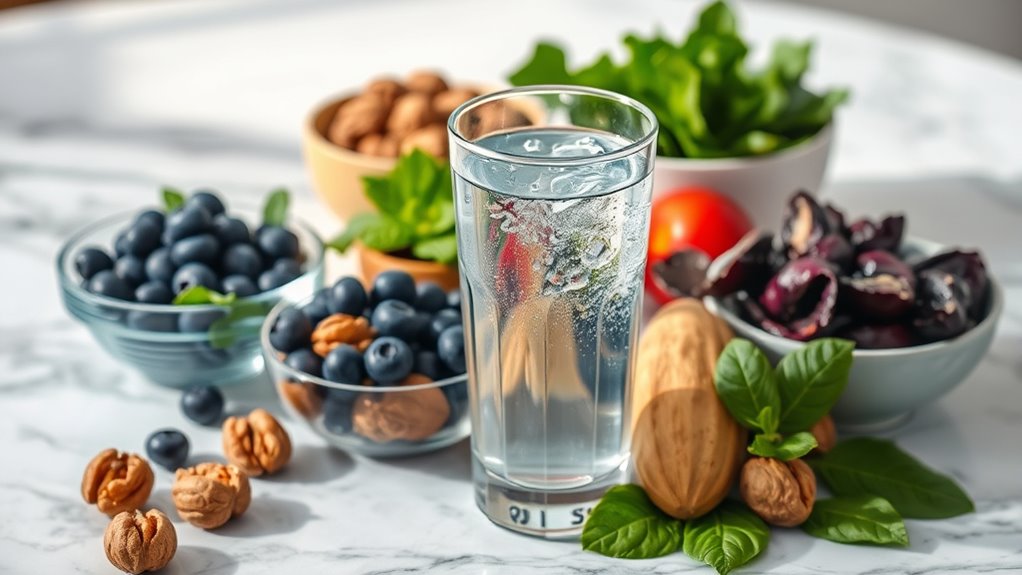
Staying well-hydrated is essential for maintaining sharp brain function, especially as you age. When you’re dehydrated, your memory and concentration can decline quickly, affecting daily tasks. Drinking enough water helps keep your mind clear and supports better cognitive performance.
Hydration Enhances Brain Function
Proper hydration is essential for maintaining ideal brain function, especially after age 40. When you’re well-hydrated, your concentration, learning, and memory improve. Drinking even small amounts of water, like 200 mL, can boost your sustained attention in tasks like searching for specific letters. Staying hydrated also enhances short-term memory, helping you recall lists more effectively. Additionally, perfect hydration supports faster reaction times and quicker processing speeds. To maximize these benefits:
- Consume adequate water daily, around 1000 mL or more.
- Maintain consistent hydration levels for sustained cognitive performance.
- Avoid overhydration, which can hinder your brain function.
- Monitor your hydration status regularly to stay in the optimal “sweet spot.”
Dehydration Impairs Memory
Dehydration markedly impairs your memory and cognitive performance by forcing your brain to work harder to complete demanding tasks. When you’re even mildly dehydrated, your brain activates more neurons, showing increased effort to maintain focus and function. Losing just 2% of your body water can impair attention, short-term memory, and psychomotor skills, making tasks feel more difficult. Mild dehydration, around four cups of water or less daily, can cause fatigue, headaches, and mood changes, reducing your mental sharpness. It also decreases brain volume, which may lead to long-term cognitive issues. Dehydration affects your ability to sustain attention, especially during longer activities, and hampers neural processes essential for memory and learning. Staying well-hydrated is essential to protect your brain’s efficiency and mental clarity.
The Synergistic Effects of Brain-Healthy Fruits and Vegetables

Combining a variety of brain-healthy fruits and vegetables creates a powerful synergy that enhances cognitive function beyond what individual foods can achieve alone. This mix supplies a broad spectrum of antioxidants, vitamins, minerals, and phytochemicals that work together to protect your brain.
- Flavonoids from berries and polyphenols from grapes amplify each other’s effects, boosting memory and reducing inflammation.
- Nutrients like folate and vitamin K from greens support blood flow and neural health more effectively when consumed together.
- The antioxidants from diverse produce help maintain neural plasticity, aiding learning and memory retention.
- Eating a colorful variety ensures coverage of multiple brain-protective compounds, offering all-encompassing support for cognitive health as you age.
Incorporating Nuts and Seeds Into Your Diet for Memory

Adding nuts and seeds to your diet is an easy way to boost your memory and support brain health. They provide healthy fats, antioxidants, and essential nutrients that enhance cognitive function. Incorporate a handful daily through snacks or toppings to enjoy these benefits effortlessly.
Nuts and Seeds Benefits
Incorporating nuts and seeds into your daily diet can be a simple yet effective way to support your memory as you age. These foods offer powerful antioxidants that fight oxidative stress, which damages brain cells and accelerates memory decline. For example:
- Boost verbal memory—eating 60 grams of mixed nuts daily can increase verbal recall by around 16%.
- Improve blood flow—nuts help enhance cerebral circulation, supporting cognitive functions.
- Provide high antioxidant levels—walnuts and pecans surpass blueberries in protecting brain cells.
- Support overall cognition—regular nut consumption benefits executive functions, verbal fluency, and working memory.
Including nuts like walnuts or seeds such as flax or pumpkin seeds adds diverse nutrients, making them an easy, effective addition to your routine.
Healthy Fats for Brain
Building on the benefits of nuts and seeds for brain health, focusing on healthy fats they provide can further boost your memory as you age. These fats, especially monounsaturated and polyunsaturated types, support neuronal membranes and neurotransmitter activity, enhancing cognitive function. Omega-3 fatty acids, found in walnuts, flaxseeds, and chia seeds, are essential for maintaining brain structure and promoting synaptic plasticity, which is crucial for learning and memory. Incorporating these fats into your diet can also improve gut health through the gut-brain axis, influencing mood and cognition. Replace saturated fats with healthier options like olive oil, add nuts and seeds to your meals, and include fatty fish regularly. These simple changes can help preserve your memory and protect against cognitive decline over time.
The Impact of Omega-3s on Cognitive Aging

Omega-3 fatty acids play a essential role in slowing cognitive aging and maintaining brain health after 40. They help preserve brain structure, improve cognitive function, and boost blood flow to the brain. Consuming EPA and DHA regularly can reduce neuroinflammation and oxidative stress, protecting your neurons. Research shows that a higher intake of omega-3s can delay cognitive decline by approximately 2.5 years and lower dementia risk. To maximize these benefits, include:
Omega-3s help slow cognitive aging, protect neurons, and reduce dementia risk after 40.
- Cold-water fish like salmon and sardines in your meals.
- Omega-3 supplements, if needed, to meet daily goals.
- Walnuts and krill as alternative sources.
- Foods fortified with omega-3s for added support.
Consistently incorporating these foods supports your brain’s health and longevity as you age.
The Role of Antioxidants in Maintaining Brain Health

Antioxidants are vital for maintaining brain health because they neutralize harmful free radicals that can damage neurons. By reducing oxidative stress, they help prevent neurodegenerative diseases and support cognitive function. Consuming foods rich in antioxidants, like berries, green tea, kale, and dark chocolate, can protect brain cells and improve blood flow. These nutrients also inhibit inflammation and support neurotransmitter health, essential for memory and thinking skills. Here’s a comparison of antioxidant sources:
| Food Source | Key Benefit |
|---|---|
| Berries | High in polyphenols, boost cognition |
| Green Tea | Contains catechins, reduce decline |
| Kale and Leafy Greens | Rich in flavonols, slow aging |
| Nuts and Fruits | Provide diverse antioxidants |
| Dark Chocolate | Flavonoids enhance blood flow |
Incorporating these foods can help maintain your brain health as you age.
How a Balanced Diet Supports Memory After 40

A balanced diet plays a crucial role in supporting your memory after 40 by providing the essential nutrients your brain needs to function at its best. When you focus on nutritional diversity, you help maintain cognitive resilience and reduce the risk of decline.
Here are key ways a healthy diet boosts your memory:
- Consuming fruits, vegetables, legumes, and whole grains supplies antioxidants and fiber, protecting brain cells.
- Limiting added sugars, refined grains, sodium, and saturated fats prevents inflammation and oxidative stress.
- Embracing diets like Mediterranean or DASH, rich in plant-based foods, nuts, and fish, supports cognitive health.
- Maintaining consistent healthy eating habits from midlife onward promotes long-term brain function and reduces neurodegenerative risks.
Prioritizing these dietary choices helps keep your memory sharp well into later years.
The Connection Between Hydration and Cognitive Function

Hydration is essential for peak cognitive function because water makes up about 75% of brain tissue, supporting its structure and operations. When well-hydrated, your brain maintains blood flow and nutrient transport, promoting ideal performance. Even mild dehydration (around 2% water loss) can impair attention, memory, and mood. It forces your brain to work harder, increasing neuronal activity to compensate. Rehydration can quickly restore cognitive abilities, often within an hour, improving mood, memory, and processing speed. For older adults, staying hydrated is crucial, especially for tasks requiring sustained attention. Use this table to understand hydration’s role:
| Effect of Hydration | Impact on Brain |
|---|---|
| Maintains blood flow | Supports nutrient delivery |
| Prevents dehydration | Preserves cognitive efficiency |
| Restores performance | Reverses cognitive decline |
| Stabilizes mood | Reduces fatigue and confusion |
Foods Rich in B Vitamins for Brain Support

Consuming foods rich in B vitamins is a practical way to support your brain’s health, especially as you age. These nutrients play a essential role in energy production, neurotransmitter synthesis, and protecting brain cells from damage. To boost your intake, consider including:
- Eggs and Dairy – high in B12, essential for memory and cognitive function.
- Leafy Greens – rich in folate, supporting neurotransmitter production.
- Whole Grains – provide B6, B2, and B3, which aid energy metabolism.
- Lean Meats and Fish – excellent sources of B12 and B6, fundamental for neural health.
Incorporating these foods helps maintain steady B vitamin levels in your brain, supporting cognitive processes and potentially slowing decline as you age.
The Power of Natural Foods in Supporting Brain Plasticity
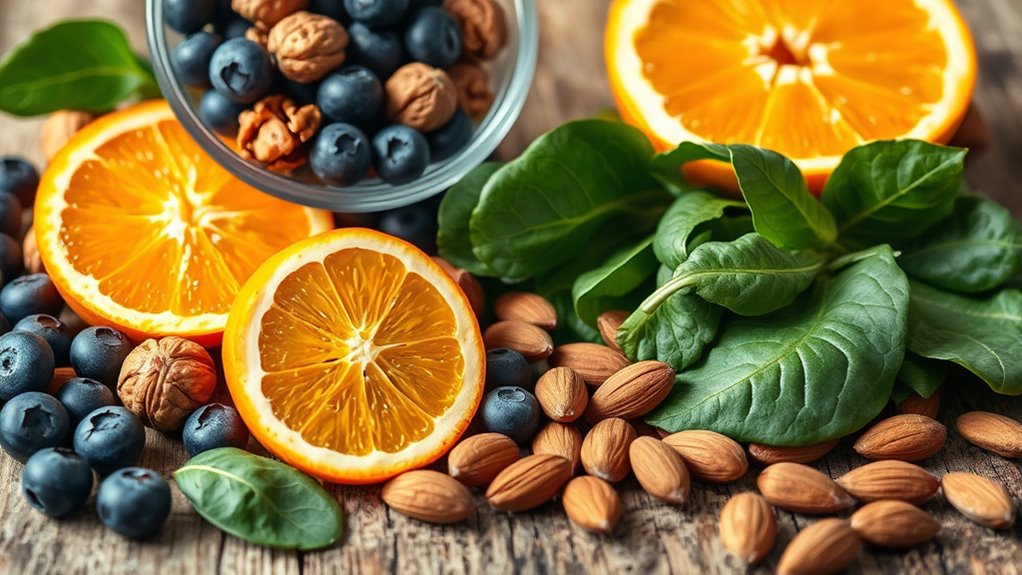
Natural foods play a vital role in enhancing your brain’s ability to adapt and reorganize through neuroplasticity. By choosing nutrient-rich options, you support the formation of new neural connections, essential for learning and memory. Omega-3 fatty acids from fatty fish and plant sources boost membrane fluidity, strengthening neural signaling and reducing inflammation. Antioxidant-rich foods like berries, citrus, and green leafy vegetables combat oxidative stress, protecting brain cells. Polyphenols in fruits, vegetables, and spices activate pathways that promote neurogenesis and mood regulation. Additionally, caloric restriction and intermittent fasting trigger cellular responses that improve synaptic function.
| Food Type | Key Benefit | Example |
|---|---|---|
| Omega-3 fats | Enhance membrane fluidity | Salmon, flaxseeds |
| Antioxidants | Fight oxidative stress | Berries, green tea |
| Polyphenols | Boost neurogenesis | Turmeric, apples |
| Micronutrients | Maintain neural connectivity | Nuts, leafy greens |
Creating a Brain-Healthy Eating Plan After 40
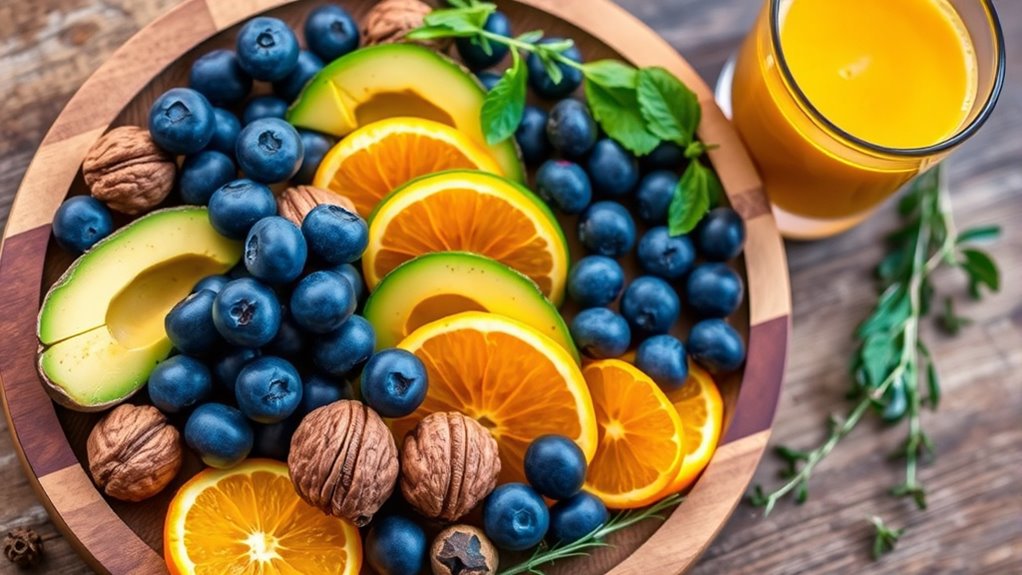
Creating a brain-healthy eating plan after 40 involves making strategic food choices that support cognitive function and long-term brain health. To get started, focus on these key strategies:
- Incorporate whole grains (3+ servings daily) for steady glucose delivery to your brain, enhancing focus and energy.
- Eat green leafy vegetables (6+ servings weekly), providing essential vitamins and antioxidants that protect neural tissue.
- Add berries (2+ servings weekly), rich in flavonoids that boost memory and slow cognitive decline.
- Consume nuts (5+ servings weekly) for healthy fats and anti-inflammatory compounds that support brain plasticity.
Frequently Asked Questions
Which Fruits Are Most Effective for Boosting Memory After 40?
You’re wondering which fruits can boost your memory after 40. Berries, like strawberries and blueberries, are top choices because they contain flavonoids that enhance brain cell signaling and reduce inflammation. Citrus fruits, such as oranges, provide vitamin C and flavonoids that support neuronal communication. Avocado’s healthy fats and antioxidants protect brain cells and improve blood flow. Incorporating these fruits into your diet can help maintain and improve your memory over time.
How Do Nuts and Seeds Support Cognitive Health Long-Term?
Nuts and seeds support your long-term cognitive health by providing essential healthy fats, B-vitamins, antioxidants, and minerals like magnesium and zinc. These nutrients protect your brain from oxidative stress, improve blood flow, and reduce inflammation, which helps preserve memory and learning skills. Regularly including a moderate amount of nuts and seeds in your diet can lower your risk of cognitive decline and support brain function as you age.
What Are the Best Fish Options for Omega-3 Intake and Brain Health?
You’re asking about the best fish options for omega-3 intake and brain health. Mackerel tops the list with 4,580 mg of omega-3s per serving, followed by salmon and herring, both offering around 2,150 mg. These fish boost cognitive function, lower dementia risk, and support mental well-being. Aim for two servings weekly, cooked by baking or grilling, to maximize benefits and keep your brain sharp and healthy.
How Can Whole Grains Improve Brain Energy and Focus?
Imagine your brain as a busy highway, constantly needing fuel to keep traffic flowing smoothly. Whole grains act like a steady supply of premium gasoline, providing slow-digesting carbs that keep your brain energized without crashes. They support neurotransmitter production, enhance focus, and sustain mental clarity. By including more whole grains in your diet, you help your brain stay sharp, alert, and ready to handle the day’s challenges.
What Beverages Best Enhance Cognitive Function and Memory Retention?
You’re wondering which beverages can boost your cognitive function and memory retention. Coffee and green tea stand out, as caffeine improves focus and memory. Berry juices and blueberry smoothies provide antioxidants that protect your brain. Ginseng tea and turmeric latte offer anti-inflammatory benefits, supporting mental clarity. Staying well-hydrated with water is essential. Regularly consuming these drinks can help sharpen your mind and support long-term brain health.
Conclusion
So, after all this, it turns out the secret to memory after 40 isn’t some fancy supplement but simply eating the right foods. Ironically, these natural options—berries, grapes, watermelons, avocados, citrus, and B vitamins—are probably sitting in your fridge right now. Who knew that boosting your brain could be as easy as enjoying everyday fruits? So go ahead, indulge—your memory’s the real winner here, and it’s craving a tasty boost!









